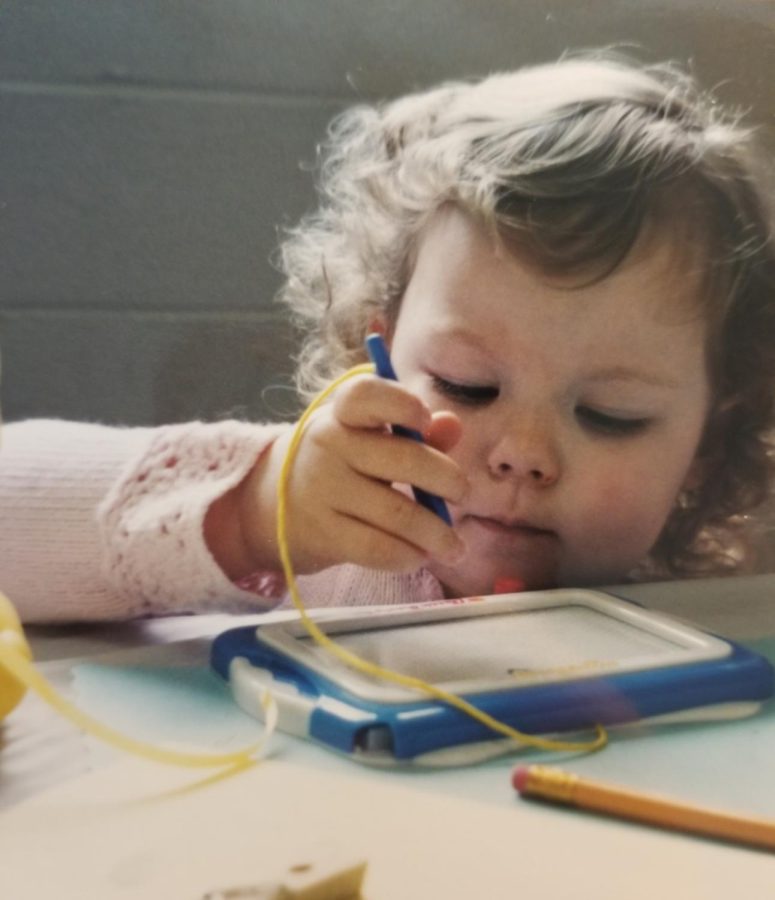The ‘art’ of failure
How to rethink hobbies in adulthood
Starting your hobby young can make it seem effortless in adulthood.
There’s a picture of me as a toddler scribbling on a toy drawing tablet, the small pen attached by a string taking up most of the space in my hand. My head is tilted, low to the table at which I sit. I am focused on the details, the way I draw today.
My mother has kept boxes full of drawings from my childhood. Most of them depict people — or a very vague interpretation of what a person looks like — something I still do to this day.
If you were to look at any one of those old drawings and think that it was something I made today, you would probably laugh. But when I made those drawings, no one laughed. Quite the opposite, actually. I was encouraged, as young creative people should be, to continue drawing. There was no rhyme or reason to keep going, other than the fact that encouragement fosters repetition. Whether or not I have a predisposition to create art, I’m not sure. Neither of my parents are artists, so it wasn’t a given that I would become interested in it. But none of that mattered at the time.
I didn’t care if I had a natural inclination to become an artist. The supplies I was using weren’t poor or high quality; they were Crayola, middle of the road, and they worked just fine. And feedback was the least of my worries, mainly because a three-year-old wouldn’t understand genuine critique, but also because a conversation with a toddler is usually filled with relentless positivity.
Cut to adulthood, where being “good” at art — or anything for that matter — seems to validate the experience exclusively.
We live in a culture plagued by self-reliance attitude and self-improvement jargon, where failure is praised in theory but instantly rejected in practice. Failure isn’t an option, even if it’s encouraged.
By the time you are an adult, it’s assumed that you should know who you are and what you’re good at. The rest, you can avoid. Being a beginner is unsettling. It’s vulnerable. So, past a certain age, we avoid being beginners. We avoid what would make us appear anything short of competent and capable. It becomes hard to love the things that risk our image when the ultimate goal, spoken or not, is perfection.
Perfection is not of any concern to a child. When I was drawing shaky lines and people with circles for hands, I could not have cared any less what it looked like; it was fun. I enjoyed doing it.
I now see that freedom to explore as a luxury. I was allowed the chance to fail, something that becomes rarer with age. That trial and error is a process we don’t always share; you wouldn’t know, looking at the end result, that dozens of renditions came before it. It’s no wonder that at this age, people who are not “good” at art dismiss their inability as a lack of talent rather than a lack of experience.
But if there’s an expectation to be perfect right out the gate, you won’t get anywhere. In gaining experience, you will fail. I certainly did. Comparing my artworks now to my artworks then, many of them from years ago were not great. They led, though, to the artworks that I am proud of.
So if our concept of talent is a myth, wherein you are either born with a certain skill or you aren’t, then our concept of failure is flawed too. We need to redefine it.
Doing something you love is, in my opinion, the farthest thing from failure. If your artwork isn’t going the way you had planned, for example, you start again. You erase or paint over it and try something different. Someone who loves the process of making art doesn’t see this as failure because they enjoy the process.
The only failure then, is to assume that editing or erasing or getting frustrated with your work means it isn’t any good. Looking at the product of a hobby you love should be enjoyable, at least most of the time. You understand what went into it, and that effort isn’t wasted, even if that one product isn’t perfect. When you’re enjoying the process, there’s no expectation. It’s the same freedom you would otherwise feel as a three-year-old, when maybe you too used to scribble.
Finding joy in what you do sounds like common sense, but it bears repeating in a world that demands perfection. Adulthood is not a requisite for perfection. Trial and error is not exclusive to children.
So I encourage you to try the thing you have been unsure about pursuing. You will be new to it, and that is fine. You are allowed to enjoy something for its own sake, without the expectation of perfection. You are allowed to fail without feeling like a failure. I promise I won’t laugh at your scribbles.

Sam Heilmann is a sophomore from Johnstown, PA. She is majoring in Communications. This is her second year on the Campus staff, and her first as Opinion...






Georgia Yeager • Feb 12, 2023 at 8:10 pm
So insightful, Samantha.